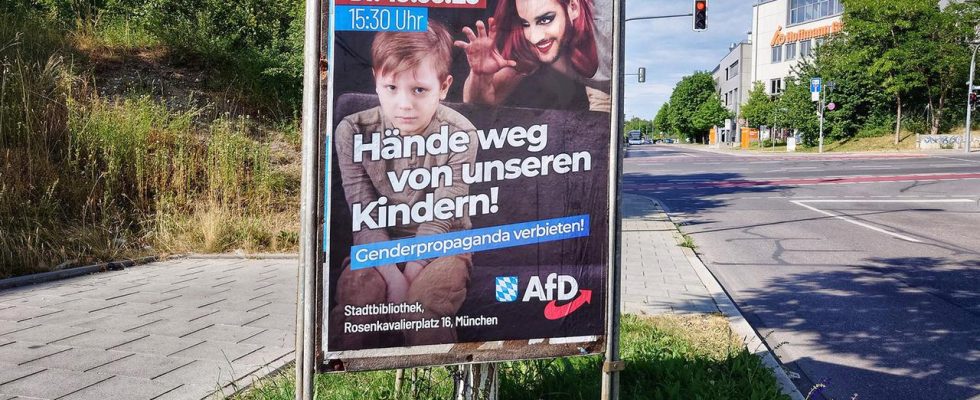context
Whether about homosexuals, drag queens or trans people: disinformation about queer people is omnipresent on social networks. From the perspective of experts, this can have devastating consequences.
“Crazy argument in England: Vagina should now be called ‘bonus hole’,” headlines “Bild.de” on July 9th. The article is about the British charity Jo’s Cervical Cancer Trust, which allegedly suggested renaming the word vagina to “front hole” or “bonus hole” in order to better reach trans men for cancer screening. Trans man describes a person who was assigned female gender at birth but identifies as male. However, not all trans men undergo gender reassignment surgery.
The topic was picked up by many other media outlets and it was also often shared on social networks. A lot of the reports are misleading.
First of all, the proposal from the organization Jo’s Cervical Cancer Trust is already from 2020 and is therefore three years old. It is also a glossary for medical personnel who perform cervical cancer screenings on trans men or non-binary people. The word vagina is not intended to be replaced, the words “bonus hole” and “front hole” are simply suggested as alternative words – with the addition that it is important which words someone would prefer to use.
On its website, the organization writes that using “the right language” when discussing someone’s gender identity is a “simple and effective way to show support and recognition.”
Right-wingers and TERFs are creating a mood
But there is great outrage in right-wing circles and among so-called trans-excluding radical feminists (TERF). British and German TERF activists consider the proposal to be “disgusting” and “misogynistic,” writing, for example, about the “extinction of women.”
Norbert Kleinwächter, deputy chairman of the AfD parliamentary group, also wrote on Twitter: “Woman with a penis and now a bonus hole. Things are getting crazier and crazier in this world of woke trans ideologues.” So-called alternative media take up the topic and thus create a mood against trans people. It is said, for example: “Wokeism” is the replacement for religion these days, or “repulsive”, anyone who believes that “transgender madness has reached its peak is wrong”, and even “these people” are “severely mentally disturbed”.
Trans people are particularly the focus of disinformation, says Kerstin Thost, press spokesperson for the Lesbian and Gay Association in Germany (LSVD). “In the last few months surrounding the debate about the Self-Determination Act, we have seen an increased attack, particularly on trans people, not only in Germany but also internationally.” An increased mobilization of hatred, agitation and “demonization against LGBTIQ*” can be observed. LSBTIQ* stands for lesbian, gay, bisexual, transgender, intersex and queer people.
Queer people portrayed as aggressive towards children
Video of a Pride parade in New York also went viral this summer. In the clip, participants can be seen walking through the streets and chanting. You can also hear the saying: “We’re here, we’re queer, we’re coming for your children” (in German: “We’re here, we’re queer, we’re coming to get your children”) . Anti-queer groups saw this as confirmation of their narrative that queer people were sexually abusive towards children.
However, it is not at all clear who shouts the line in question in the video. Because the participants who can be seen clearly sing “We’re here, we’re queer, we’re not going shopping” – which translated means something like: “We are here, we are queer, we are “not here to shop”. The line about the children can only be heard from voices that are not visible in the video and are obviously close to the camera, which is why they are so present.
Nevertheless, the video achieved a wide reach and was even distributed in Germany. The former AfD parliamentary group leader in the Berlin House of Representatives, Georg Pazderski, tweeted, for example: “YOU say it quite openly, THEY are after our children.”
The AfD, among others, uses this narrative to deliberately create a mood against queer people. On the occasion of a reading by drag queens for children in Munich, the AfD put up posters with the slogan: “Hands off our children!” – it shows a supposed drag queen reaching for a frightened-looking child.
Argument with supposed child protection
Portraying queer people as a threat to children’s safety is a widespread disinformation narrative, write Swedish scientists Cecilia Strand and Jakob Svensson in one Briefing for the European Parliament. Especially in the education sector, an attempt is being made to denigrate sex education by, for example, seeing children as victims of indoctrination. “The image of the innocent and vulnerable child appears to be particularly effective in triggering a ‘moral panic’.”
This narrative has been used by opponents of equality since the 1970s, says Thost from the LSVD. “A calm and age-appropriate approach to issues of sexual and gender diversity is demonized by right-wing populists and religious fundamentalists. These campaigns are intended to unsettle parents, children and educators.”
But sexual violence and pedophilia in particular are often associated with queer people by disinformation actors. The European Digital Media Observatory (EDMO) writes in an analysisthat it even goes so far as to “falsely claim that one of the privileges of belonging to this community is precisely to commit sexual violence, including against children and animals”.
Resistance to alleged “gender ideology”
According to EDMO, an alleged “dictatorship” of queer philosophy is another widespread narrative. As alleged evidence, incorrect or misleading reports would be used, according to which words like mother should be banned – or the example mentioned at the beginning of the alleged renaming of the vagina to “bonus hole”.
A fighting term used in Germany in this regard is the “homo and trans lobby,” says Thost from the LSVD. “The use of the term ‘lobby’ manipulates through associations with power influence, lack of transparency and conspiracy. Claims for equal treatment and recognition are intended to be fended off.”
Svensson and Strand also write in their briefing that the most common narratives include negative heteronomy or resistance to a supposed “gender ideology”. Religious motives such as the restoration of the “natural order” and the protection of the “natural” family also played a role.
Who is spreading the disinformation?
According to Svensson and Strand, the disinformation actors are a complex, international network, ranging from families to anti-abortion groups, religious conservatives, nationalists and far-right groups.
In Germany, disinformation about queer people is most often spread by right-wing conservative to right-wing extremist groups and parties, but also by fundamental religious organizations, says Thost. They would try to address people “who have not yet taken a clear position against the acceptance of LGBTIQ* and are unsettled – i.e. people who have little or no contact with openly living LGBTIQ* people.” These are often more receptive to ideologies of inequality.
However, the disinformation reaches a broad section of society and is spread further, for example via social networks. This contributes to an anti-queer breeding ground for society as a whole, which can also lead to hate crimes against the LGBTIQ* community.
rise anti-queer Violence
The number of registered cases of hate crime against lesbians, gays, bisexuals, transgender and intersex as well as queer people has been steadily increasing since it began being recorded in 2001. Alone in Last year the police registered more than 1,400 crimes. According to the Federal Ministry of the Interior, 1,005 crimes fall into the “sexual orientation” category, 227 of which are violent crimes. 417 further cases were assigned to the topic of “gender diversity”, of which 82 were violent acts. Since 2018, the number of recorded crimes has increased by almost 200 percent.
These numbers only reflect the crimes that are reported and properly registered. However, according to various experts, the number of unreported cases is very high. That’s how it goes from the current one Annual Report of the International Lesbian, Gay, Bisexual, Trans and Intersex Association (ILGA) shows that around 90 percent of incidents in Germany go unreported.
One representative survey by the EU Fundamental Rights Agency from 2020 supports this and comes to the conclusion that only 13 percent of those surveyed affected by the incidents filed a police report.
But it is not just the low willingness of those affected to report that the number of unreported cases is high. Deficits in the investigation process and incomplete statistical recording are also part of the problem, according to the study “Anti-queer hate crime in Germany” by Sarah Ponti. “There are glaring gaps in research regarding the extent, manifestations and background of anti-queer violence and how security authorities and the judiciary deal with these manifestations of hate crime.”
“Words can become actions”
LGBTIQ* are still a vulnerable social group, says Sven Lehmann, queer commissioner for the federal government. “There are also increasing attacks as part of CSDs. Fueled by targeted campaigns, violence is directed against visible queer life and is intended to intimidate LGBTIQ*.”
Thost also observes a “backlash” in response to past political successes for the human rights of queer people. More visibility does not necessarily mean more security. “The targeted spread of disinformation about our community shows us that we are still not accepted as a completely natural part of society. Our existence is defamed as unbelievable and questioned.”
This ensures that queer people feel unsafe in public discourse, but also in public spaces. “Words can become actions. Just the sight of a drag queen, a trans person or a lesbian or gay couple can motivate violent criminals to strike brutally. If before every amorous look, before a hug, before a kiss in a public space, the surroundings are checked first “That’s a significant restriction on freedom,” says Thost.


